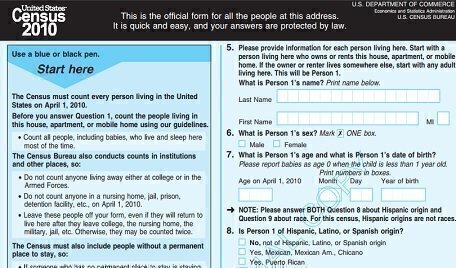The state of California will sue the Trump administration over the upcoming 2020 census and its inclusion of a question about U.S. citizenship, California state attorney general Xavier Becerra said Monday night.
 Becerra is expected to announce the lawsuit, which could also include 18 other states, on Tuesday morning. The move comes after the Commerce Department said Monday night that it would add the question as a way to better comply with the Voting Rights Act.
Becerra is expected to announce the lawsuit, which could also include 18 other states, on Tuesday morning. The move comes after the Commerce Department said Monday night that it would add the question as a way to better comply with the Voting Rights Act.
“Today, the U.S. Department of Commerce announced that a question on citizenship status will be reinstated to the 2020 decennial census questionnaire to help enforce the Voting Rights Act (VRA). Secretary [Wilbur] Ross’s decision follows a request by the Department of Justice (DOJ) to add a question on citizenship status to the 2020 decennial census,” the department said in a statement.
The Commerce Department now will send a proposed list of 2020 Census questions to Congress.
“The citizenship question will be the same as the one that is asked on the yearly American Community Survey (ACS). Citizenship questions have also been included on prior decennial censuses. Between 1820 and 1950, almost every decennial census asked a question on citizenship in some form,” the department said.
In 2010, the citizenship question wasn’t included the full Census. Instead, the annual, detailed ACS, which goes to about 2.5 percent of the U.S. households, asks about citizenship. The Justice Department now believes the error rate is too high in that annual survey and the differences in sampling groups between the annual ACS and the decennial Census are too great for it to fairly decide Section 2 claims, along with redistricting claims.
Previously, Becerra and officials from 18 other states told Commerce Secretary Ross threatening a lawsuit if the Census Bureau includes a question about citizenship on its main 2020 Census form. Becerra and the group believe the question creates several constitutional problems because large immigrant groups could be underrepresented in the Census.
“The U.S. Constitution requires ‘counting the whole number of persons in each State.’ Adding a citizenship question would fatally undermine the accuracy of the 2020 Census and reduce response rates, especially among immigrant and noncitizen communities,” Becerra said in the letter to Ross in February. He also argued that the lateness of the request is impractical; states could lose representatives in Congress and federal funding due to a wrong Census tally; and that the request actually makes it harder to enforce Section 2 of the Voting Rights Act.
Law professor Nathaniel Persily identified some of issues related to the Voting Rights Act in a 2011 law review article for the Cardozo Law Review. “This lack of national citizenship data on a par with census population data presents several quandaries for voting rights law,” Persily said. One issue is that incomparable data could lead to problems when it comes to determining if Section 2 violations in cases based on the number of persons or voters in a district.
The question of whether a state can be required to use total population or total citizens to design legislative districts was settled in 2015 by the Supreme Court. In a majority opinion in Evenwel v. Abbott, Justice Ruth Bader Ginsburg said that a state couldn’t be barred from using total population to determine a voting district. But the Court also acknowledged that a 1966 decision, Burns v. Richardson, permitted states also to use registered voters who were citizens to determine a legislative district.
Scott Bomboy is the editor in chief of the National Constitution Center.







